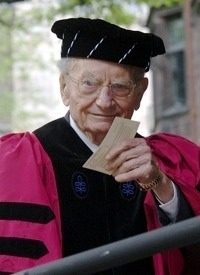
Long-renowned economist Paul Samuelson died on December 13 at his home in Belmont, Massachusetts, at the age of 94. In addition to writing Economics in 1948 — which became the best selling economics textbook for several decades, having been translated into forty-one languages and selling over four million copies — Samuelson also won the Nobel Memorial Prize in Economic Sciences in 1970.
The chorus of accolades of effusive praise continues to resonate:
“Through his research, teaching, and writing, [Samuelson] had more impact on the economic life of this country and the world than any government economic official…” —Larry Summers, nephew of Samuelson, and Director of the White House National Economic Council.
“Paul Samuelson was both a path-breaking and prolific economic theorist and one of the greatest teachers that economics has ever known.” — Ben Bernanke, Federal Reserve Chairman
“Samuelson was the Julia Child of economics…” — Robert Lucas, Nobel Prize winner
“Paul Samuelson was far and away the leading economist in the country.” —George Akerlof, Nobel Prize winner
“Paul Samuelson created modern economics…” —Robert Hall, Stanford University professor
Praise for his work, however, was far from unanimous, however. Dr. Mark Skousen, editor for Forecasts and Strategies, did a detailed analysis of Samuelson’s textbook in 2002, and concluded:
In my judgment, it is difficult to sidestep the conclusion that as the teaching of introductory economics has followed in Samuelson’s footsteps, its advice has contributed to certain of the economic problems that the United States faces today.
Samuelson has appeared to favor a substantial role for the state…[he] has been a strong supporter of the welfare state and [government] antipoverty programs.
From www.finance.yahoo.com comes the admission that “Samuelson was a liberal, and…a follower of British economist John Maynard Keynes, who proposed that a nation needs an activist government that could foster low unemployment by steering tax and monetary policies, even if it meant deficit spending…”
Samuelson well knew what he was doing. He said, “I don’t care who writes a nation’s laws — if I can write its economics textbooks.”
According to the Herald Tribune, Samuelson’s textbook “introduced generations of students to the revolutionary ideas of John Maynard Keynes…who developed the theory that modern market economies could become trapped in depression and would then need a strong push from government spending…to restore them. Many economics students would never again rest comfortably with the [belief that] private markets would cure unemployment [automatically] without need of government intervention.”
Business Week magazine once said his textbook had “gone a long way in giving the world a common economic language.”
Free-market Economist Milton Friedman (who won the Nobel Prize in economics in 1976 and who first met Samuelson while both were students at the University of Chicago) disagreed with Samuelson’s solutions and emphasis on government interference in the marketplace. The two would often appear in public debates, and wrote opposing views for several years in columns in Newsweek magazine. In addition, Friedman’s position was persuasively presented through his PBS television series, Free to Choose.
So effective was Friedman in his public debates with Samuelson that Samuelson said “he always had fear in his heart when he prepared for combat with Friedman, who was a formidable opponent.” He said, “If you looked at a transcript [of a debate] afterward, it might seem clear that you had won the debate on points. But somehow, with members of the audience, you always seemed to come off as elite, and Milton seemed to have won the day.”
According to James Poterba, former head of MIT’s Department of Economics, “Samuelson leaves an immense legacy…as one of the giants on whose shoulders every contemporary economist stands.”
Many, however, take strong exception to that. Nearly 300 economists recently signed a petition opposing federal stimulus funds. The petition states:
"Notwithstanding reports that all economists are now Keynesians, we do not believe that more government spending is a way to improve economic performance.”
Peter Robinson, writing as Man Friday in Forbes magazine, quotes Samuelson as having said, “Everyone understands that there can be no solution without government.” Robinson asks, “If [these] economists and more than half the American people are against you, then who is this “everyone” of whom you spoke?”
Photo of Paul Samuelson: AP Images



